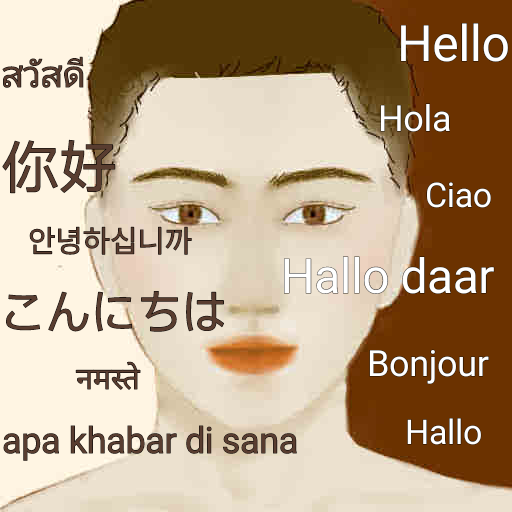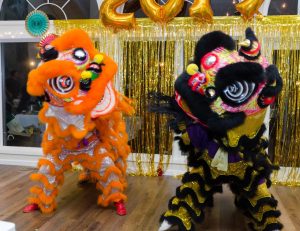Balancing identities between the two worlds of bilingualism

Many people struggle with balancing to speak two languages, ultimately causing them to feel lost and empty.
March 25, 2021
Every time my family and I watch a Korean drama, I find myself closely looking at the English subtitles while the rest of my family members effortlessly laugh at the Korean jokes. I ask my mom what one of them mean and all I hear back is:
“You won’t get it.”
These words have resonated with me throughout my entire childhood, but I always let them pass over me because I knew deep down that I belonged. By “belonged” I mean being somewhat able to speak and understand Korean. However, right next to this sense of belonging was also a profound sense of disconnect. A disconnect fueled from bouncing back and forth between Korean and English but never settling on one.
Thus, there are times when I feel empty. My capacity of speaking English isn’t filled all the way but neither is my capacity of speaking Korean. There are times when I mispronounce certain English words and say them with a Korean accent and there are times when I make up Korean words.
However, I’m not the only one. This struggle with “language identity” is common among many bilinguals. The NCBI interviewed four bilingual participants and asked them to rank how much they identify with each of their two cultures (one being weak or partially and 10 being completely). Each of the participants ranked higher for one culture over the other, but no one ranked both cultures a 10 out of 10.
Moreover, Emily Han, a sophomore at Dougherty Valley High School (DVHS), finds herself in the same predicament.
“I have been speaking Mandarin for 15 years and also speak English. But I only speak English unless I am talking to my parents or another Chinese parent who does not speak English. Hence, there are cases where I often feel very disconnected with my family and culture because of the fundamental gap between English and Mandarin,” said Han.
Why is this the case? The main reason is the environmental context or the influence an environment or setting has on one’s decision to speak a certain language. For example, a student speaks English at school because it’s much more convenient to communicate with, not only for themself but also for their friends and teachers. At other times, they may speak their other language for easier communication.
However, there are two sides to environmental context. On one hand, it allows bilinguals to preserve both languages. But on the other, it perpetuates this feeling of being lost and never fully identifying with one side.
As for Han, she believes that although she has to bounce between speaking Mandarin and English, it’s the best way to not only preserve both languages but also embrace them.
“What I have been telling myself is to practice both languages and respect their similarities and differences. So speaking a language that you are less comfortable with is grueling but rewarding to you and your peers,” said Han.
But for DVHS sophomore Daniel Municio, he experienced the opposite.
“It’s hard to balance speaking Spanish and English because in a lot of cases, I don’t know what I am to others. At traditional events, I’m considered more of an English speaker to my Spanish family and relatives. But at other times, I’m considered more of a Spanish speaker to my English-speaking friends, teachers, and classmates, so it feels like neither is ‘right’ to me,” said Municio.
Needless to say, language is one of the main causes of one being confused with their identity. Municio goes as far as to say that “I feel like I don’t have an identity because I speak two languages.”
For me, I’m in the middle. I’m grateful that I have the ability to switch languages depending on the situation and at least the opportunity to embrace both, but at the same time, it’s difficult to definitively identify myself under one language.
However, some people might say that cultural assimilation is the actual root cause of identity struggles, and balancing two cultures is the biggest challenge. As a Korean-American, I can confirm that trying to practice American culture while preserving Korean culture is nowhere near easy.
One of my daily struggles is showing affection. In Korean culture, ways of showing love and affection are very indirect and less physical. For example, one of my parents’ ways of showing affection is telling me to eat more food, which translates to “I’m looking out for your health because I love you.” Whereas in American culture, saying “I love you” is more normal, and physical forms of affections such as hugging or kissing aren’t considered as awkward.
Consequently, the challenges I face are when I’m tempted to say “I love you” to my parents but the Korean part overpowers me and I ultimately choose to ask “Did you eat?” Due to this profound difference, I sometimes feel that partially immersing myself in each culture is the maximum I can achieve.
Han even states that cultural differences are one of the factors that divide her and her parents.
“Though my parents also live in America, it’s more difficult for them to assimilate into the Western communities because they spent most of their lives in China. As a result, there is this disconnect since what I believe is socially acceptable is often considered ‘nontraditional’ in my parents’ eyes,” said Han.
But despite the dominance of culture, it’s imperative to realize that language plays a pivotal role in culture. The ability to speak another language allows one to have the opportunity to immerse themselves into their cultures (i.e. communicating with others to learn more), but the challenge arises when one tries to preserve their bilingualism in an environment where one language is spoken much more than the other.
Han confirms this idea by clarifying the importance of language.
“Language is an essential part of culture, and because culture is contrived from the differences between groups of people, the use of a language to fully immerse yourself into your culture is much more prominent and important than other methods such as wearing clothes or eating food,” said Han.
Thus, people must recognize the struggles with balancing languages and be aware that bilingualism plays a large role in shaping one’s identity. So for any bilinguals who are feeling lost, don’t feel pressured into thinking that the only way you can identify yourself is by picking one language to speak. Embrace the ability to speak two languages, don’t feel guilty for it.
Perhaps my identity will consist of speaking the combination of English and Korean: Konglish.







Sammy Minioza • May 4, 2021 at 2:47 pm
Really well written and a fascinating perspective!